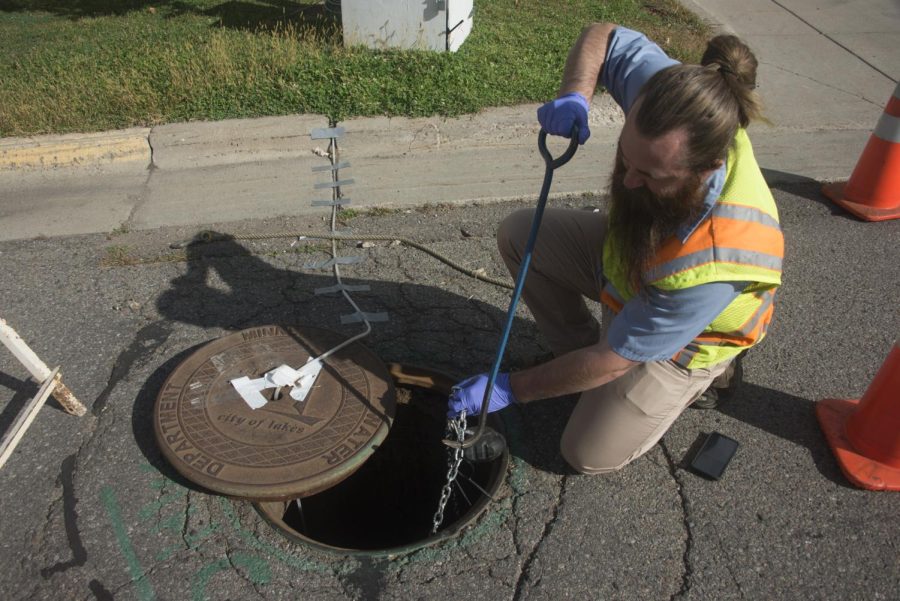After a basement fire and gas leak prompted multiple evacuations along University Avenue over the summer, Dinkytown business owners are still waiting for answers while the investigations into the causes of the incidents remain ongoing.
The first incident of a fire and blown-out manhole covers on June 30 as well as a petroleum leak on Aug. 2 forced some Dinkytown businesses to close for several hours before receiving an all-clear from the Minneapolis Fire Department (MFD) to reopen. Businesses a half-mile west of Huntington Bank Stadium between University Avenue and Fifth Street were forced to shut down, according to Raising Cane’s owner Kent Kramp.
Brian Van Dyke is the owner of D.P. Dough in Dinkytown, one of the businesses forced to shut down during both incidents. Van Dyke, who was working at the time of the explosion, said he “had never heard a sound that loud.” He smelled gasoline throughout the entire street and saw open manholes from the covers being blown off.
Although his staff was paid during the roughly six-hour evacuation, Van Dyke said his restaurant took a significant hit from lost revenue and was “dead in the water” until it received an all-clear to resume business operations.
“Margins are tight and in the restaurant industry, a bad month can end a restaurant that’s been around for a while, especially during the summer when sales are down anyway,” Van Dyke said.
Despite the roughly $2,500 of total revenue D.P. Dough lost from the evacuations, Van Dyke said he feels fortunate neither incident occurred on particularly busy or profitable days for the restaurant.
“I’m surprised [the evacuations] happened twice, to be honest,” Van Dyke said. “But you keep your fingers crossed and we just keep slinging calzones, that’s all we can do.”
Next door to D.P. Dough, Raising Cane’s was also temporarily shut down from the explosion and petroleum leak, Kramp said. Kramp, who lost “thousands of dollars” of revenue from the evacuations, said he was frustrated by the lack of closure from the incidents.
“It’d be nice to have a little more clarity and a little bit better understanding of why this happened,” Kramp said. “Obviously, you don’t want explosions in your neighborhood or gas leaks or anything like that. It’s terrifying.”
The Metropolitan Council is leading the investigation into both incidents in partnership with the University of Minnesota and Minnesota Pollution Control Agency (MPCA). In an Aug. 30 news release, the Council stated they are still investigating the source and identity of the hazardous materials in the sewer system near the University.
The Council is currently investigating chemical manufacturing and transportation companies in a 370-acre area near the University, which potentially leaked the petroleum that caused the Aug. 2 evacuation, according to Senior Metropolitan Council Public Relations Manager Bonnie Kollodge. The area was chosen based on sewer lines that traced wastewater from the Aug. 2 petroleum leak.
According to Kollodge, the Council has one electric monitor for flammable substance levels in sewer systems on campus with more to be installed, as well as twice-daily, in-person monitoring for flammable and hazardous gasses inside maintenance holes near campus. Additionally, the MPCA has inspected 18 underground petroleum tanks across six facilities in Minnesota.
“We applaud the actions of emergency responders,” Met Council Chair Charlie Zelle said in an email to the Minnesota Daily. “Meanwhile, we’re doing everything we can to put measures in place that warn officials of inappropriate or illegal discharges into the sewer systems and reduce the chances of future evacuations.”
During the September Board of Regents meeting, University Senior Vice President for Finance and Operations Myron Frans said in addition to its partnership with the Metropolitan Council, the University has installed additional real-time monitors around its facilities along University Avenue to check for hazardous materials in the sewer system with plans to install more.
Frans said during the meeting the new monitors will be used “especially for events and response to activities where there are a lot of people,” such as football games.
Although he still does not know why it happened, Kramp said he was appreciative of the preventative and public safety measures taken by officials. In the meantime, he plans to operate business-as-usual.
“I’ve operated on campus for 17 years and never had this happen,” Kramp said. “Hopefully it’s resolved so it doesn’t happen again, but without [Metropolitan Council] telling us what happened officially, I’m just worried it could happen again.”



















